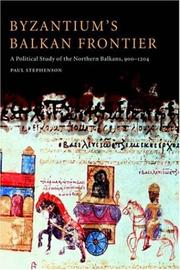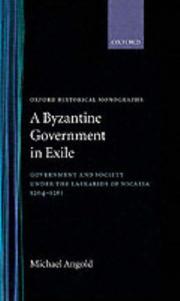| Listing 1 - 10 of 37 | << page >> |
Sort by
|
Book
ISBN: 8879882422 9788879882422 Year: 2001 Volume: 13 Publisher: Spoleto (Perugia): Fondazione Centro italiano di studi sull'alto medioevo,
Abstract | Keywords | Export | Availability | Bookmark
 Loading...
Loading...Choose an application
- Reference Manager
- EndNote
- RefWorks (Direct export to RefWorks)
Power (Social sciences) --- Pouvoir (Sciences sociales) --- Byzantine Empire --- Empire byzantin --- Politics and government --- Politique et gouvernement --- Power (Social sciences) - Byzantine Empire --- Byzantine Empire - Politics and government - 527-1081 --- Byzantine Empire - Politics and government - 1081-1453
Book
ISBN: 9781846312090 1846312094 Year: 2009 Volume: 52 Publisher: Liverpool: Liverpool university press,
Abstract | Keywords | Export | Availability | Bookmark
 Loading...
Loading...Choose an application
- Reference Manager
- EndNote
- RefWorks (Direct export to RefWorks)
This translation, with commentary and introduction, brings together three important, if generally neglected, works that cast great light on politics and ideology in early Byzantium. Agapetus wrote, c. 527-30 CE, from a position sympathetic to the emperor Justinian, when he had still to consolidate his authority. He sets out what an emperor must do to acquire legitimacy, in terms of government as the imitation of God. The Dialogue, written anonymously towards the end of the same reign, comprises fragments from Books 4-5 of a philosophically sophisticated (and now lost) longer work, setting out requirements for the ideal polity, based on a similar concept of imperial rule, with extensive comment on matters of current political salience but from an implicitly hostile standpoint. Not only does the text reflect the nature of Neoplatonic political philosophy but it also delves into the inner realities of the time, and the political problems of Constantinople during the first half of the sixth century. The third text was written by Paul the Silentiary to mark the re-dedication of the Great Church Hagia Sophia, built thirty years earlier under Justinian's orders.
Byzantine Empire --- Empire byzantin --- History --- Sources --- Histoire --- Politics and government --- Neoplatonism --- Byzantine literature --- Agap¿etos. --- Paul, --- Neoplatonism. --- Byzantine literature. --- Sources. --- Byzantine Empire - History - Justinian I, 527-565 --- Byzantine Empire - Politics and government - 527-1081
Book
ISBN: 9025607020 9789025607029 Year: 1976 Publisher: Amsterdam Hakkert
Abstract | Keywords | Export | Availability | Bookmark
 Loading...
Loading...Choose an application
- Reference Manager
- EndNote
- RefWorks (Direct export to RefWorks)
Constitutional history, Medieval --- Slavs --- Byzantine Empire --- Politics and government --- 949.7 --- Geschiedenis van de Balkanlanden --- 949.7 Geschiedenis van de Balkanlanden --- Slavic race --- Ethnology --- Indo-Europeans --- Politics and government. --- Slavs - Byzantine Empire --- Byzantine Empire - Politics and government
Book
ISBN: 9783406716324 3406716326 Year: 2018 Volume: 71 Publisher: München : Beck,
Abstract | Keywords | Export | Availability | Bookmark
 Loading...
Loading...Choose an application
- Reference Manager
- EndNote
- RefWorks (Direct export to RefWorks)
Legislators --- Aristocracy (Social class) --- Social conditions. --- Byzantine Empire --- History --- Legislative bodies --- Upper chambers. --- Politics and government. --- Upper chambers --- Politics and government --- Emperors --- History. --- Rome. --- Rome --- Legislative bodies - Upper chambers --- Byzantine Empire - Politics and government

ISBN: 1107118921 1280154616 0511118236 0511150563 0511324693 0511496613 0511049269 0511008465 9780511008467 0511034024 9780511034022 9780511150562 9780511118234 9780521770170 0521770173 9780511496615 9781280154614 9781107118928 9780511324697 9780511049262 9780521027564 052102756X 0511083114 Year: 2000 Publisher: Cambridge Cambridge University press
Abstract | Keywords | Export | Availability | Bookmark
 Loading...
Loading...Choose an application
- Reference Manager
- EndNote
- RefWorks (Direct export to RefWorks)
Byzantium's Balkan Frontier is the first narrative history in English of the northern Balkans in the tenth to twelfth centuries. Where previous histories have been concerned principally with the medieval history of distinct and autonomous Balkan nations, this study regards Byzantine political authority as a unifying factor in the various lands which formed the empire's frontier in the north and west. It takes as its central concern Byzantine relations with all Slavic and non-Slavic peoples - including the Serbs, Croats, Bulgarians and Hungarians - in and beyond the Balkan Peninsula, and explores in detail imperial responses, first to the migrations of nomadic peoples, and subsequently to the expansion of Latin Christendom. It also examines the changing conception of the frontier in Byzantine thought and literature through the middle Byzantine period.
Balkan Peninsula --- Byzantine Empire --- Byzantium (Empire) --- Vizantii︠a︡ --- Bajo Imperio --- Bizancjum --- Byzantinē Autokratoria --- Vyzantinon Kratos --- Vyzantinē Autokratoria --- Impero bizantino --- Bizantia --- Politics and government. --- Politics and government --- Ethnic relations. --- Balkans --- Empire byzantin --- Ethnic relations --- Politique et gouvernement --- Relations interethniques --- History of Greece --- anno 900-999 --- anno 1000-1099 --- anno 1100-1199 --- 527-1081 --- 1081-1453 --- Arts and Humanities --- History --- Balkan Peninsula - Politics and government --- Byzantine Empire - Politics and government - 527-1081 --- Byzantine Empire - Politics and government - 1081-1453 --- Byzantine Empire - Ethnic relations
Book
ISBN: 9004433384 9004431802 9789004431805 9789004433380 Year: 2020 Publisher: Leiden Boston
Abstract | Keywords | Export | Availability | Bookmark
 Loading...
Loading...Choose an application
- Reference Manager
- EndNote
- RefWorks (Direct export to RefWorks)
In La Diplomatie byzantine, de l’Empire romain aux confins de l’Europe (Ve-XVe s.), twelve studies explore from novel angles the complex history of Byzantine diplomacy. After an Introduction, the volume turns to the period of late antiquity and the new challenges the Eastern Roman Empire had to contend with. It then examines middle-Byzantine diplomacy through chapters looking at relations with Arabs, Rus’ and Bulgarians, before focusing on various aspects of the official contacts with Western Europe at the end of the Middle Ages. A thematic section investigates the changes to and continuities of diplomacy throughout the period, in particular by considering Byzantine alertness to external political developments, strategic use of dynastic marriages, and the role of women as diplomatic actors. Contributors are are Jean-Pierre Arrignon, Audrey Becker, Mickaël Bourbeau, Nicolas Drocourt, Christian Gastgeber, Nike Koutrakou, Élisabeth Malamut, Ekaterina Nechaeva, Brendan Osswald, Nebojša Porčić, Jonathan Shepard, and Jakub Sypiański.
Middle Ages. --- Civilization, Medieval. --- Civilization, Medieval --- Medieval civilization --- Middle Ages --- Civilization --- Chivalry --- Renaissance --- Dark Ages --- History, Medieval --- Medieval history --- Medieval period --- World history, Medieval --- World history --- Medievalism --- History --- Byzantine Empire - Foreign relations - 527-1081 - Congresses --- Byzantine Empire - Foreign relations - 1081-1453 - Congresses --- Byzantine Empire - Politics and government - 527-1081 - Congresses --- Byzantine Empire - Politics and government - 1081-1453 - Congresses --- Byzantine Empire --- Bajo Imperio --- Bizancjum --- Bizantia --- Byzantinē Autokratoria --- Byzantium (Empire) --- Impero bizantino --- Vizantii︠a︡ --- Vyzantinē Autokratoria --- Vyzantinon Kratos --- Foreign relations --- Politics and government
Book
ISSN: 07510594 ISBN: 2951919824 9782951919822 Year: 2004 Volume: 14 Publisher: Paris Association des amis du Centre d'histoire et civilisation de Byzance
Abstract | Keywords | Export | Availability | Bookmark
 Loading...
Loading...Choose an application
- Reference Manager
- EndNote
- RefWorks (Direct export to RefWorks)
Petitions --- Pétitions --- Congresses. --- Congrès --- Byzantine Empire --- Empire byzantin --- Politics and government --- Sources --- Politique et gouvernement --- Conferences - Meetings --- Pétitions --- Congrès --- Social pressure --- Byzantium (Empire) --- Vizantii︠a︡ --- Bajo Imperio --- Bizancjum --- Byzantinē Autokratoria --- Vyzantinon Kratos --- Vyzantinē Autokratoria --- Impero bizantino --- Bizantia --- Petitions - Byzantine Empire - Congresses --- Byzantine Empire - Politics and government - Sources - Congresses
Book
ISBN: 9781409436089 9781315261942 9781351956550 140943608X Year: 2013 Volume: 14 Publisher: Farnham Ashgate
Abstract | Keywords | Export | Availability | Bookmark
 Loading...
Loading...Choose an application
- Reference Manager
- EndNote
- RefWorks (Direct export to RefWorks)
Authority is an important concept in Byzantine culture whose myriad modes of implementation helped maintain the existence of the Byzantine state across so many centuries, binding together people from different ethnic groups, in different spheres of life and activities. Even though its significance to understanding the Byzantine world is so central, it is nonetheless imperfectly understood. The present volume brings together an international cast of scholars to explore this concept. The contributions are divided into nine sections focusing on different aspects of authority: the imperial authority of the state, how it was transmitted from the top down, from Constantinople to provincial towns, how it dealt with marginal legal issues or good medical practice; authority in the market place, whether directly concerning over-the-counter issues such as coinage, weights and measures, or the wider concerns of the activities of foreign traders; authority in the church, such as the extent to which ecclesiastical authority was inherent, or how constructs of religious authority ordered family life; the authority of knowledge revealed through imperial patronage or divine wisdom; the authority of text, though its conformity with ancient traditions, through the Holy scriptures and through the authenticity of history; exhibiting authority through images of the emperor or the Divine. The final section draws on personal experience of three great ‘authorities’ within Byzantine Studies: Ostrogorsky, Beck and Browning.
Authority --- History --- Byzantine Empire --- Politics and government --- Religious life and customs --- Intellectual life --- Social conditions --- Politics and government. --- Religious life and customs. --- Intellectual life. --- Social conditions. --- Authority - History - To 1500 --- Byzance --- Byzantine Empire - Politics and government --- Byzantine Empire - Religious life and customs --- Byzantine Empire - Intellectual life --- Byzantine Empire - Social conditions
Book
ISBN: 0902089137 9780902089136 Year: 1971 Volume: 5 Publisher: London : Variorum Reprints,
Abstract | Keywords | Export | Availability | Bookmark
 Loading...
Loading...Choose an application
- Reference Manager
- EndNote
- RefWorks (Direct export to RefWorks)
Byzantine Empire --- Empire byzantin --- History, Military --- Economic conditions --- Politics and government --- Histoire militaire --- Conditions économiques --- Politique et gouvernement --- 306.096 --- 306.09495 --- Social sciences Culture and institutions Africa --- Social sciences Culture and institutions Modern Greece and Byzantine Empire --- Politics and government. --- History, Military. --- Economic conditions. --- Conditions économiques --- Byzantine Empire - Politics and government --- Byzantine Empire - History, Military --- Byzantine Empire - Economic conditions

ISBN: 0198218540 9780198218548 Year: 1975 Publisher: Oxford Oxford university press
Abstract | Keywords | Export | Availability | Bookmark
 Loading...
Loading...Choose an application
- Reference Manager
- EndNote
- RefWorks (Direct export to RefWorks)
Byzantine Empire --- Nicaea, Empire of --- -Politics and government --- Politics and government --- Social history --- -Thirteenth century --- 949.504 --- 13th century --- Middle Ages --- Descriptive sociology --- Social conditions --- History --- Sociology --- History Modern Greece and Byzantine Empire, 1204-1453 --- -Nicaea, Empire of --- Politics and government. --- Byzantine Empire - Politics and government - 1081-1453 --- Nicaea, Empire of - - Politics and government --- -Byzantine Empire
| Listing 1 - 10 of 37 | << page >> |
Sort by
|

 Search
Search Feedback
Feedback About UniCat
About UniCat  Help
Help News
News